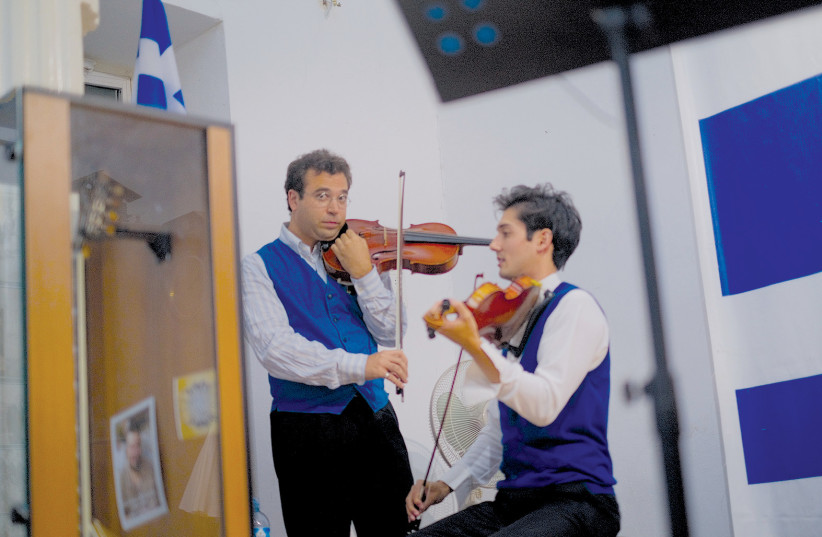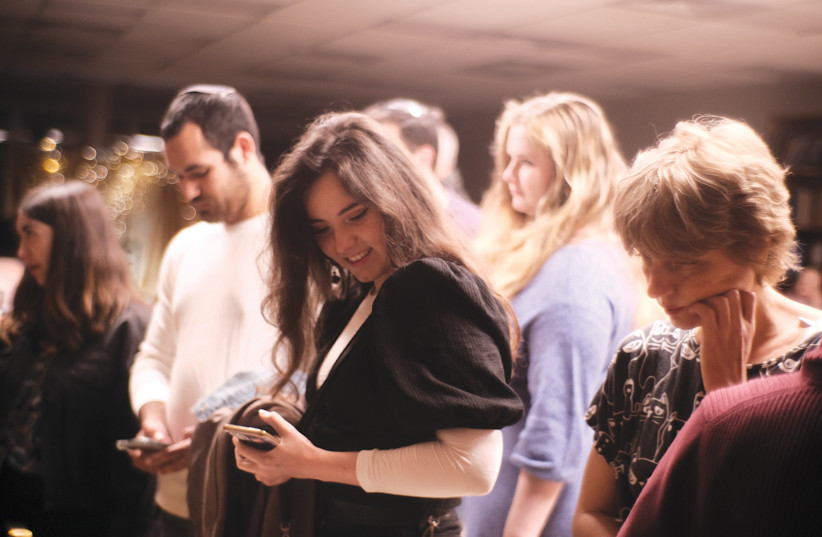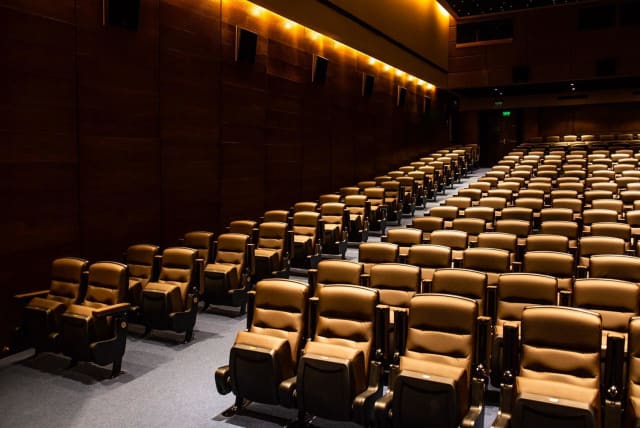LGBTQ+ celebration is not limited to the month of June. Nor is it limited to progressive cities or secular communities. With this in mind, Havruta and String Theory will be hosting a “Night of Queer Joy” concert on February 28.
Havruta? String Theory? Are we learning physics in a beit midrash (study hall)? Not quite
Havruta is an organization of LGBTQ+ people who are on the religious spectrum, which works internally to support community empowerment, as well as outwardly to accept queer people in religious society and strengthen Jewish identity in the LGBTQ+ community.
The organization, originally aimed at serving the needs of religious gay men, has recently begun expanding its programming.
String Theory is a platform that makes classical music more accessible to a different audience. This can be financial accessibility, for example, as founder and managing director Niki Forman explained: “You might want to go to the symphony but tickets cost quite a bit of money, which makes it pretty prohibitive as a first-timer. It’s not really something a young person is going to take a risk on.”
A violist in the Jerusalem Symphony Orchestra, Forman has been in the classical music community for most of her life. In the past year, she began turning her passion for sharing that community into action.
She pointed out that “the concert hall can be a pretty intimidating, impersonal space. We take great classical music and bring it into our community – into synagogues, into apartments, into gardens. And we meet people where they are, as opposed to trying to bring them into places that are maybe not so comfortable for them.”
A more intimate setting is as enjoyable for the performers as it is for the audience. “I’ve played in big halls, and honestly you sometimes forget that there are audience members there,” she said. “There’s such a disconnect.
“I [used to have] chamber music, string quartet rehearsals in my living room, and my roommates and their friends would want to come to listen. There was so much more intimacy and electricity in the room. And it was a far more fun experience playing for this audience that was really enthusiastic to be there.”
From these impromptu living room concerts, String Theory was born.
FORMAN CO-FOUNDED the group with Noah E. Abramowitz, a musician and writer who works at Speaknow, an AI online assessment of English proficiency. His official title at String Theory is co-founder and chief of alcohol, as he is responsible for curating a unique menu of cocktails for each concert.
Jason Greenspan, the director of programming at Havruta, met Forman at a Shabbat meal and was happy to get involved. “For me, [the String Theory-Havruta event presents] an exciting opportunity to plan an event that is open to the public and exposes people to queer culture. Or to expose people to classical culture that they’ve experienced before, but with a queer twist.”
Queer representation is often tragic, but this will be a celebration
“Queer representation is often pretty tragic, and we wanted to make a night of celebration,” Forman explained. “Queer contributions to classical music was a thing that I had known about for some time and was already interested in exploring. But it needed to be in a larger framework within that community – not just us doing this at that community.”
Greenspan explained that there is a particular initiative within Havruta that aims to present queer culture through an academic lens called Maskila and that this event with String Theory is part of that initiative.
“This is another way that Havruta likes to provide programming for religious LGBT people and create LGBT events with a religious vibe,” said Greenspan of the upcoming concert, “or that religious people would feel comfortable going to.”
“Comfortable spaces for queer religious Jews,” Forman agreed, “is a thing that we should be working on.”
Concert-goers can look forward to hearing the works of classical composers whom historians are fairly certain were queer, such as Tchaikovsky and Chopin, as well as the more modern Leonard Bernstein, who was somewhat more open about his homosexuality.
They will also have the opportunity to hear contemporary lesbian cellist Talia Erdal, principal cellist in the Jerusalem Symphony Orchestra; and singer, actor and drag performer Uri Elkayam, who will be starring in the Paramount Plus' upcoming season of Queen of the Universe- a spinoff of RuPaul's Drag Race.
A native Jerusalemite, Erdal was raised secular, became religious as a young woman, and now lies “somewhere in between.” Judaism is a central part of her life and identity.
“I’m very connected to the tradition,” she said. “I feel very Jewish; I feel very religious. I love our history. I love our religion. And also, I’m so gay. I love being gay. I want to be able to sing love songs to women.”
While she was performing a Tchaikovsky piece at the Jerusalem Piano Festival, it occurred to Erdal that a whole concert dedicated to queer composers could be very interesting. The next day, she received a message from Forman asking if she would like to perform in the “Night of Queer Joy” and thought, “This must be min hashamayim (from heaven)!”
“All the composers that we play in this program had to hide their identity in a way,” Erdal noted. “Most of the great pieces [of classical music] were written a long time ago; gay people had to hide their identity or live a lie.”
She also noted that the classical community and the Orthodox Jewish community share more than meets the eye. “I think both of these cultures – classical music and religion or orthodoxy – are praising the past and [are concerned] with interpreting the past. There’s always a feeling of yeridat hadorot.”
Yeridat hadorot in this case refers not just to the Jewish concept that people in past generations were more spiritual, wiser and closer to God. It also refers to the idea within the classical community that the best composers have already lived and died, and the best compositions have already been written.
“As someone who lives in two cultures that praise the past so much, there’s something about the present that I really love,” Erdal said with a big smile. “I’m so grateful to live now, where I can celebrate myself and live as my [true] self.
“One thing that made me really happy,” Erdal revealed,” was when I realized that all these people whose music I’m going to play in the concert had to hide, and I don’t. It also made me happy about having my own music in the program. I’m a part of that lineage, that heritage of classical musicians. I live now, and I don’t have to hide anymore. It made me a bit emotional when I realized that.”
Elkayam also connected with Forman through the classical music world when he performed, in drag, a piece traditionally sung by a woman, with the Jerusalem Symphony Orchestra. One of Elkayam’s many claims to fame is his ability to sing in registers generally unattainable by male opera singers. He is also an accomplished stage, television and film actor.
“I was trained to be an actor, and this is one of the platforms and the ways to [connect] to my feminine side.”
Elkayam will be transforming into his drag persona for the "Night of Queer Joy," sharing his talents as a queer classical music practitioner.
The concert is scheduled for 8 p.m. on February 28 at the Greek Community Cultural Centre of Jerusalem. Doors open at 7:15 p.m., as does the bar. Tickets can be purchased here: http://bit.ly/3x8uEgy
Having attended a previous String Theory concert, witnessed the magic of Forman’s community organizing, enjoyed Abramowitz’s fabulous cocktails, and seen Erdal perform live, I believe this promises to be a fabulous event. I’m excited to see what String Theory and Havruta can create together. ❖









































































































